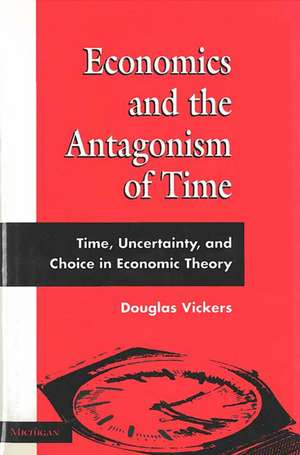Economics and the Antagonism of Time: Time, Uncertainty, and Choice in Economic Theory
Autor Douglas Vickersen Limba Engleză Hardback – 2 mai 1994
Presenting a rigorous examination of the place and significance of time in economic theory, Douglas Vickers takes up the interrelated issues of uncertainty, ignorance, and criteria of choice. In the discussion of these questions he explains that the conventional thought-forms of probability are not generally applicable to theory-building in economics. To remedy this he provides a completely new paradigm of choice.
The extent to which time has influenced, or been excluded from, economic theory is discussed on four levels: the banishment of time in general equilibrium theory; the incorporation of logical time, in pseudotemporal dynamic analysis in some widely adopted mathematically structured systems; the construction of ceteris paribus dynamics based on conventially determined behavior; and the analysis of in-time economics, or the results of incorporating into economic theorizing historic time, ignorance, and uncertainty in a nonprobabilistic sense. A scheme of choice and decision making is presented that incorporates the concept of “potential surprise” in place of probability.
Economic theorists and scholars in related disciplines will appreciate the originality of the book’s critique of the neoclassical system; its tracing of some of the most relevant intellectual history that sets off the traditions of Keynes and the post-Keynesians from the neoclassical system; the clarification of the meaning of – and the dissent from – probability theorizing in economics; and the treatment of the relevant epistemological foundations of the subject.
The extent to which time has influenced, or been excluded from, economic theory is discussed on four levels: the banishment of time in general equilibrium theory; the incorporation of logical time, in pseudotemporal dynamic analysis in some widely adopted mathematically structured systems; the construction of ceteris paribus dynamics based on conventially determined behavior; and the analysis of in-time economics, or the results of incorporating into economic theorizing historic time, ignorance, and uncertainty in a nonprobabilistic sense. A scheme of choice and decision making is presented that incorporates the concept of “potential surprise” in place of probability.
Economic theorists and scholars in related disciplines will appreciate the originality of the book’s critique of the neoclassical system; its tracing of some of the most relevant intellectual history that sets off the traditions of Keynes and the post-Keynesians from the neoclassical system; the clarification of the meaning of – and the dissent from – probability theorizing in economics; and the treatment of the relevant epistemological foundations of the subject.
Preț: 567.64 lei
Preț vechi: 737.19 lei
-23% Nou
Puncte Express: 851
Preț estimativ în valută:
108.62€ • 113.64$ • 90.23£
108.62€ • 113.64$ • 90.23£
Carte indisponibilă temporar
Doresc să fiu notificat când acest titlu va fi disponibil:
Se trimite...
Preluare comenzi: 021 569.72.76
Specificații
ISBN-13: 9780472104970
ISBN-10: 0472104977
Pagini: 288
Ilustrații: figures
Dimensiuni: 152 x 229 mm
Greutate: 0.71 kg
Editura: UNIVERSITY OF MICHIGAN PRESS
Colecția University of Michigan Press
ISBN-10: 0472104977
Pagini: 288
Ilustrații: figures
Dimensiuni: 152 x 229 mm
Greutate: 0.71 kg
Editura: UNIVERSITY OF MICHIGAN PRESS
Colecția University of Michigan Press
Descriere
A careful reconsideration of time in economics leads to a new paradigm of choice
